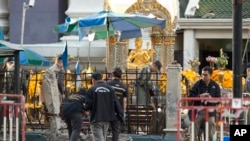Thai police have for the first time publicly linked last month's deadly bombing of a Bangkok shrine to China's Uighur ethnic minority group.
Investigators said Tuesday they believe the bombing was a revenge attack carried out by human traffickers who smuggled Uighurs through Thailand.
"The cause was the human trafficking networks — networks transferring Uighurs from one country to another," said National Police Chief Somyot Poompanmoung. "Thai authorities destroyed or obstructed their human trafficking business."
A month before the attack, Thailand forcibly deported to China more than 100 members of the Turkic-speaking Uighur group, which complains of persecution by Beijing. The decision was condemned by rights groups and exiled Uighur organizations.
Thai officials had for weeks hinted but refused to say definitively that the mostly Muslim Uighur group was linked to the August 17 bombing, which killed at least 20 people and injured dozens of others, mostly Chinese tourists.
Thai authorities have arrested two foreigners in the case. One of the suspects, Yusufu Mieraili, was found with a Chinese passport that listed his birthplace as Xinjiang, a region in western China that is home to the Uighurs.
The other suspect, identified as Adem Karadak, was detained at a Bangkok apartment where bomb-making material was found. The nationality of neither man has been confirmed.
Thai officials said Tuesday they believe another key suspect, identified as Abudureheman Abudasataer, has fled to Istanbul, Turkey. Turkish officials, however, say they have no record of the man entering Turkey.
The bombing at the Erawan Shrine is the deadliest bombing in Thailand's recent history, but officials have been reluctant to label the incident an act of terrorism, for fear it could hurt the country's important tourism industry.







